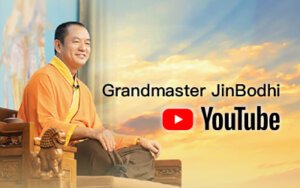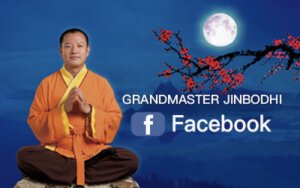In Buddhism, for a person to attain health, happiness, and wisdom, they must practice the Six Perfections (Paramitas), with generosity (dāna) being the first. Why did Sakyamuni Buddha encourage us to practice generosity frequently? What benefits does giving bring, and how does it contribute to our accumulation of merit? This article will guide you through the true meaning behind this noble act.

Understanding the Meaning of Generosity: It is More Blessed to Give than to Receive
Generosity typically refers to acts of kindness where one selflessly gives or shares what they have with others, driven by compassion. It is a form of giving that expects nothing in return, a way to pass on love and kindness to others.
The true value of generosity lies in cultivating the giver’s compassion and selflessness, purifying the mind, and reducing greed and attachment. Grandmaster JinBodhi once said, “It is more blessed to give than to receive.” Through acts of generosity, one can develop a mindset of selflessness and generosity, reducing attachment to material possessions. Generosity can also earn the respect and gratitude of others, enhancing mutual support and understanding between people. Those who practice generosity are the happiest, most joyful, and wealthiest people in the world.
Different Forms of Giving: Dharma Giving is the Most Supreme and Brings the Greatest Merit
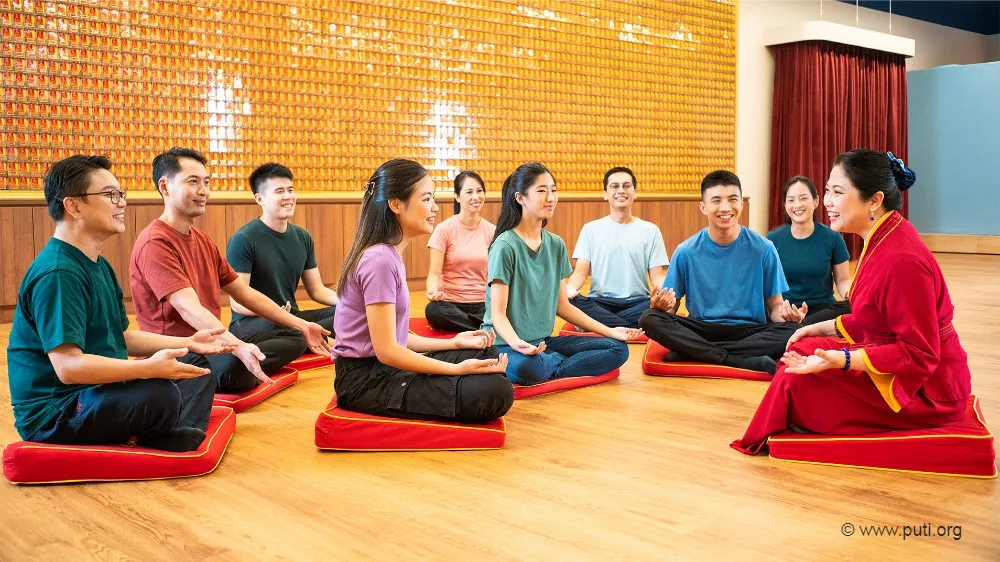
When people think of generosity, they often think of donations, but giving is not just about offering money or material goods. In reality, there are many ways to practice generosity, such as giving your time, knowledge, and skills.
Depending on what is given, the practice of generosity can be categorized into the three following types:
● Material Giving:
Material giving is the most common form of generosity and can be divided into two categories: external and internal giving. External giving involves offering material possessions such as wealth, food, clothing, and medicine to alleviate others’ suffering from hunger, cold, or illness. Internal giving refers to offering one’s energy and skills to help others.
● Dharma Giving:
Dharma giving involves sharing the teachings of Buddha, wisdom, and knowledge with others. The recipients of Dharma giving can be individuals or groups. This can be done by teaching the principles of Buddhism, spreading wisdom, sponsoring the printing and distribution of Buddhist scriptures, or dedicating the merit of chanting and reciting sutras to sentient beings.
● Fearless Giving:
Fearless giving involves providing others with a sense of security and helping them overcome inner fears, offering emotional comfort and support. Sincere praise can boost someone’s confidence, alleviating anxiety and insecurity, while a friendly smile can convey warmth and care, easing another’s worries. These acts of emotional encouragement and support also fall under fearless giving.
Among these three forms of generosity, Dharma giving is considered the most supreme. While material giving is important, the benefits of material resources are finite. In contrast, the benefits of sharing Dharma and wisdom can be enjoyed by others throughout their lives. Thus, Dharma giving is regarded as the most noble, effective, and meaningful form of generosity.
Learn More: Praise Generates Great Energy
Why Should We Practice Generosity Regularly? What Are the Benefits?
Generosity brings immense benefits both materially and spiritually. The following explains the benefits and merits of giving:
The Benefits of Giving
Reduces Greed: Cultivates generosity and reduces selfishness.
Purifies the Mind: Inspires compassion, fostering peace and wisdom.
Transforms Risks: Sharing wealth accumulates good karma, potentially averting personal crises.
Brings Dharma Joy: Creates happiness, known as “Dharma joy,” surpassing material rewards.
Elevates Character: Shifts the mindset from selfishness to nobility, broadening one’s heart and spiritual growth.
The Merits of Giving
Generosity is like planting a seed in the soil; with proper care and nourishment, it will bear abundant fruit. The Mahaparinirvana Sutra lists ten merits of generosity: beauty, wealth, longevity, happiness, strength, health, safety, good friends, eloquence, and the joy of celestial beings. The merits of generosity are boundless.

Grandmaster JinBodhi once shared the following story:
During the time of the Buddha, there was a wealthy man in the Kingdom of Kapilavastu who was the brother of Maudgalyayana, one of the Buddha’s foremost disciples renowned for his supernatural powers. Although this man was immensely wealthy, he was extremely stingy and never engaged in acts of generosity or offering. One day during meditation, Maudgalyayana sensed that his brother might face misfortune, and so he decided to guide him towards a better path. The venerable Maudgalyayana reminded his brother that the more wealth one accumulates and the more fame one gains, the more likely one is to attract thieves and corrupt officials, and that one could even lose everything to the merciless forces of fire and water.
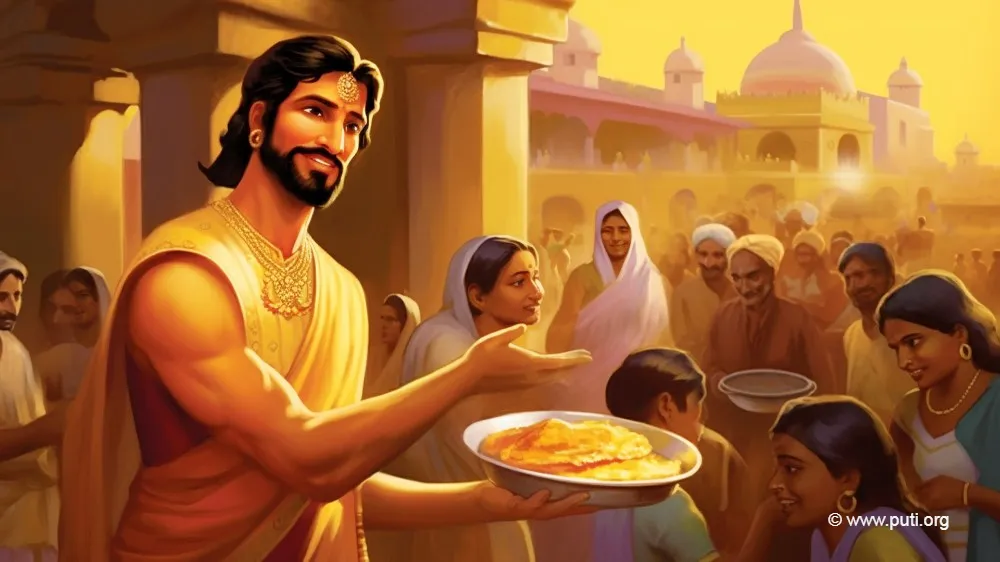
Maudgalyayana said, “No one can escape death. When the time comes, you can’t take anything with you except the sins you have committed, which lead you to suffering and downfall. Therefore, you should do more good deeds and engage in generosity to accumulate some merit for the future.” His brother, who had always been greedy, realized the truth in Maudgalyayana’s words and began to practice generosity, helping the poor and needy. As he continued his acts of giving, he earned the respect, praise, and gratitude of others, which brought him great happiness and contentment.
After a year of giving, the brother noticed that his wealth had not increased and sought an explanation from Maudgalyayana. The venerable Maudgalyayana then used his supernatural abilities to show him a vision of the future: due to the merit he had accumulated from his generosity and acts of charity, he would be reborn in the heavenly realms as a king. There, a magnificent palace filled with treasures awaited him.
The brother finally understood the immense merit generated by generosity, and from that moment on, he became even more dedicated to giving and helping others, finding joy and fulfillment in these actions. This story illustrates that generosity can bring about great merit and blessings, even transforming one’s destiny and elevating the quality of one’s life.
Learn More:
The Rewards of Respect and Generosity
The Six Perfections – Generosity
Understanding the Law of Karma: Good Causes Yield Good Results
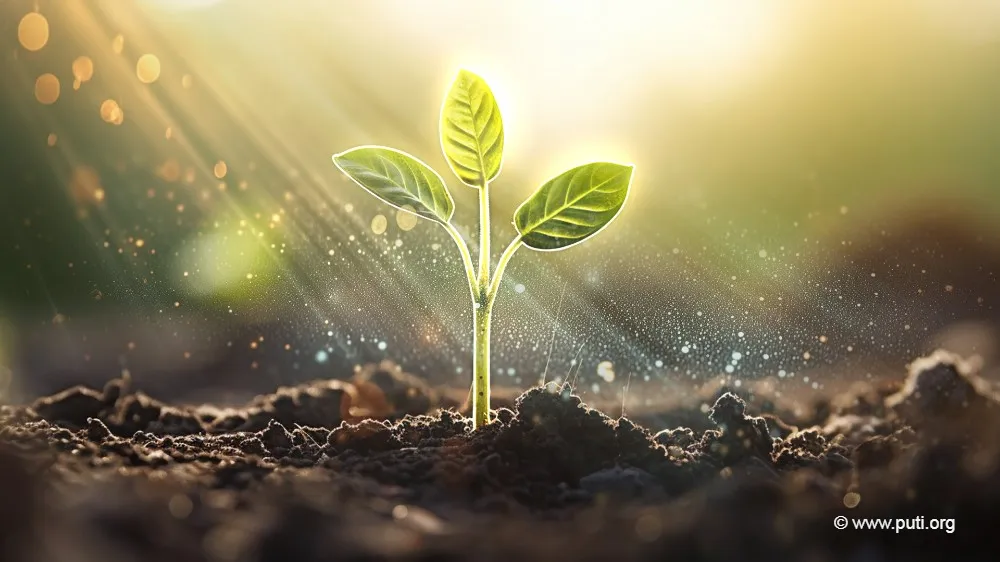
“Karma” is one of the most fundamental theories in Buddhism and is considered a natural law, a principle that governs all things. What is “karma”? It is the concept that every action has a corresponding consequence. As the saying goes, “You reap what you sow.” Good deeds result in positive outcomes and good karma, while bad deeds lead to negative outcomes and bad karma. Karma is like a shadow that follows you everywhere, whether good or bad and cannot be avoided.
Once you understand the concept of karma, it’s important to follow the Buddha’s teachings by doing good deeds and accumulating merit. Generosity is a virtuous action that plants the seeds of good karma, leading to blessings and happiness. By practicing generosity, we plant good seeds that will yield positive results in this life and in future lives.
Learn More:
Learn about Causality | Sow Kind Causes, Reap Kind Effects
Recognizing Causality | Understanding Causality for Fate Transformation
Revealing the Marvels of Generosity and Understanding the Profound Meaning of Good Deeds

Grandmaster JinBodhi teaches that “causes” lead to “effects,” and the experience that people derive from these effects is known as “retribution.” What we often hear as “karmic retribution” refers to the consequences one experiences from one’s actions. The Buddhist scriptures describe five wonderful rewards of generosity: wealth, good appearance, longevity, happiness, and rebirth in the heavens. Generosity not only changes a person’s fate in this life, bringing worldly blessings such as wealth, beauty, longevity, and good reputation, but it can also lead to transcendent blessings in future lives, such as rebirth in the heavenly realms.
Karmic retribution is not always a one-to-one exchange. The Earth Store Bodhisattva’s Vow Sutra mentions, “For every one that is given, ten thousand will be received in return.” This means that even a small act of generosity can result in immense rewards. The same principle applies to negative actions. Therefore, we should strive to “do good,” practice generosity, and plant seeds of goodness everywhere.

Generosity is not merely about giving material possessions; it is also a profound spiritual practice. Through the act of giving, we learn to let go of selfishness, open our hearts, and embrace others. The heart becomes more expansive and compassionate with each act of generosity. In the process, we experience inner satisfaction and joy. Every act of giving is a cleansing of the soul and a step forward in spiritual growth. We should practice generosity widely and accumulate the resources of merit and virtue for ourselves.
Learn More:
A Small Good Deed Could Be Repaid with a Life-Saving Return
Bodhi Meditation | Practicing Generosity for Lasting Prosperity

In today’s society, everyone aspires to live a life filled with happiness, wealth, and blessings. However, the path to achieving these desires often seems elusive. Grandmaster JinBodhi frequently shares in livestreams and teachings that through generosity and spiritual practice, one can change one’s destiny and achieve a fulfilling life. Under his guidance, Bodhi Meditation practitioners actively participate in various charitable activities, spreading love and warmth to those in need. At the same time, they experience comprehensive improvements in body, mind, and spirit: some have avoided disasters and navigated life crises; others have seen their careers thrive and businesses flourish; while some have achieved greater harmony in their family relationships.
If you wish to learn more about methods for improving your body, mind, and spirit, we invite you to visit a Bodhi Meditation Center near you for more information. For additional insights on generosity and causality, follow Grandmaster JinBodhi’s YouTube channel, where his livestreams will bring you the latest teachings.
Learn More:
